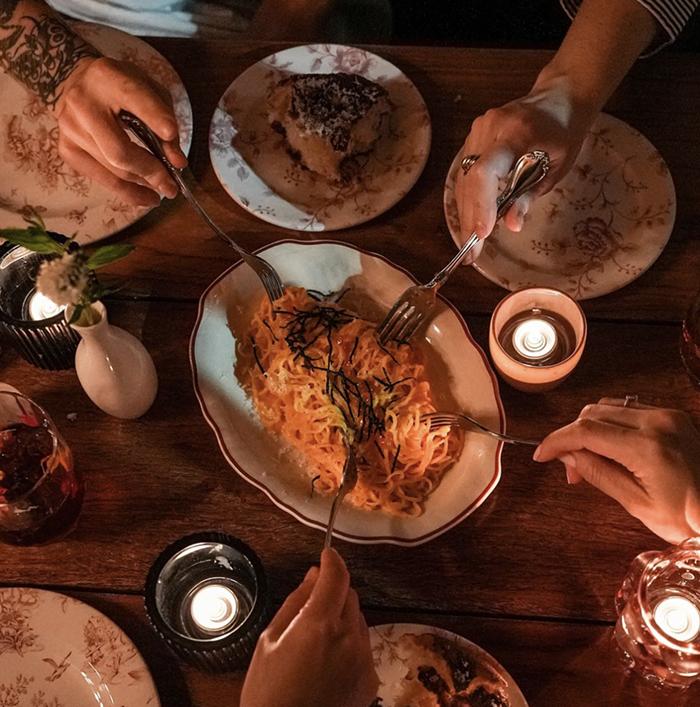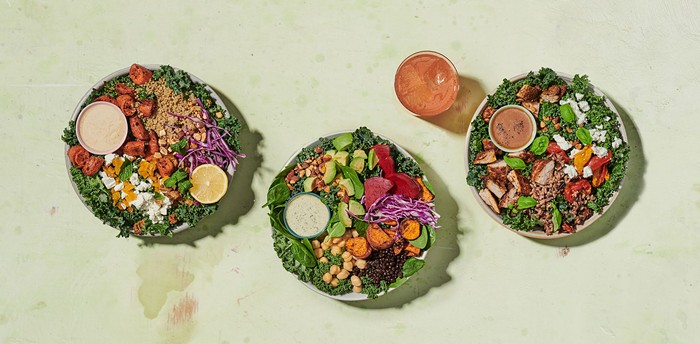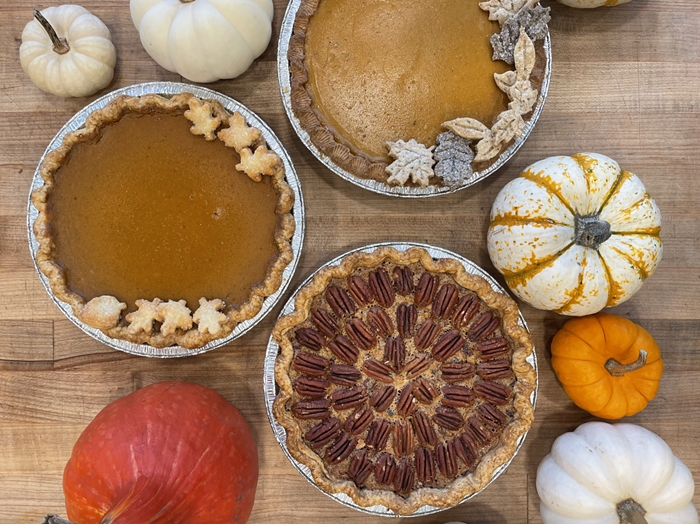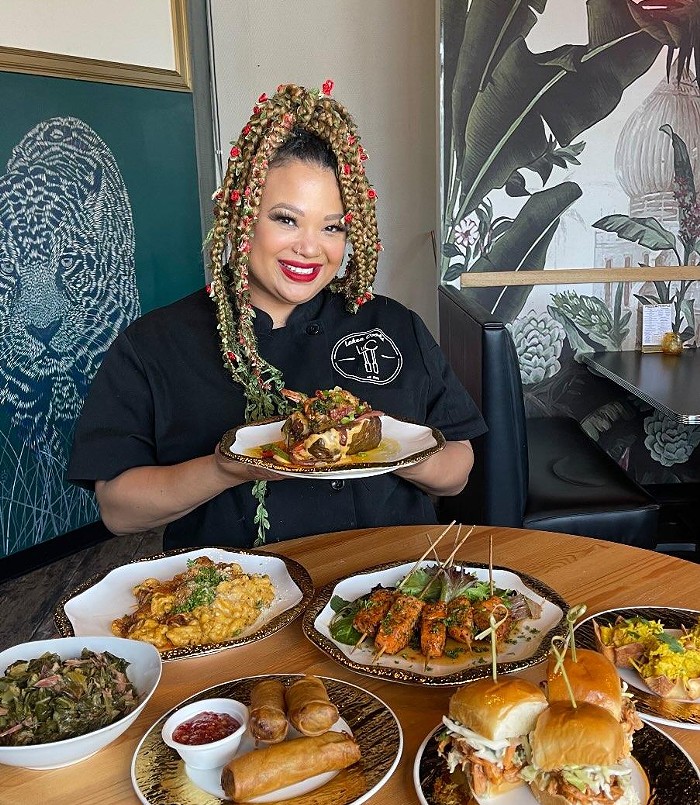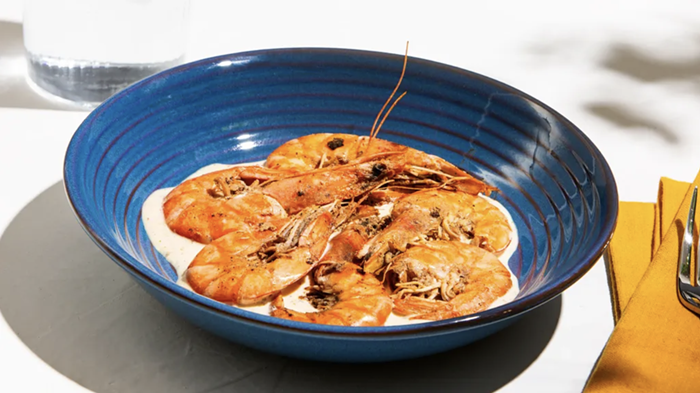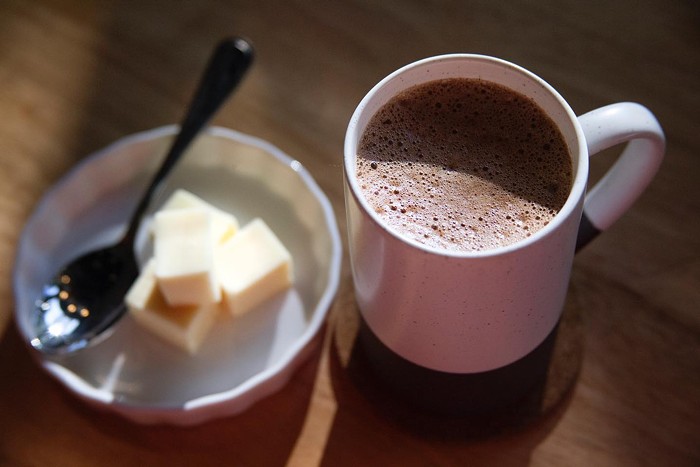If you haven't already noticed, Seattle is deep in the midst of a tiki thing. Looking for a drink with rum and fruit juice that's maybe on fire and served in a kitschy vessel? You can have one on nearly any night of the week: on "Tiki Sunday" at downtown's Pennyroyal, on "Tiki Monday" at Belltown's Rob Roy, on "Taco and Tiki Tuesdays" at Essex in Ballard, and on "Tiki Wednesdays" at Rumba on Capitol Hill. Now you can have one seven days a week at Ballard's Hotel Albatross, which opened in January and whose menu boasts "exotic cocktails" and, in the words of owner Zach Harjo, "exotic street food."
Seattle's latest interest in tiki is all about craft cocktails—high-quality rum, fresh fruit juices, and house-made syrups and bitters, all carefully mixed into balance. "Tiki cocktails are delicious," says Harjo, "and one of the highest expressions of the craft."
The drinks, often served in ceramic mugs meant to emulate Polynesian woodcarvings depicting gods and spirits, supposedly transport you to sandy beaches where the weather is warm and life is simple. It's about escapism. Exactly which tropical locale you're escaping to, though, has never seemed to matter much.
When Ernest Raymond Beaumont Gantt (who later legally changed his name to Donn Beach) opened his bar Don the Beachcomber in Los Angeles in 1933, he wrote a menu of Caribbean rum–based drinks with Southeast Asian names like the Sumatra Kula and, according to the Don the Beachcomber website, "decorated the place with his South Pacific gewgaws, along with old nets and parts of wrecked boats he scavenged from the oceanfront." His bar was an immediate success. A genre was born.
Harjo, who also owns Ballard's Ocho, says he and co-owners Keith Bartoloni and Drew Church (who also co-own nearby bar Hazlewood) created Hotel Albatross "because Seattle, more than anywhere, needs a room that you can enter and feel like you are somewhere else, drink from a flaming coconut, and recall skinny-dipping with manta rays in warm waters, making out with someone who doesn't speak your language, or being attacked by a monkey."
I love a good daiquiri and especially one that comes, as the Death's Hammer ($9)—a classic combination of rum, lime, and sugar, with fresh nutmeg—does, in a ceramic skull-shaped mug. Tiki drinks are awash in sugar, so there's real skill involved in making them pleasantly—but not cloyingly—sweet, as Albatross does with its Puka Punch ($23), a combination of rums, pineapple juice, and falernum (a rum-based syrup with spices such as cloves and allspice), served in a hollowed-out pineapple with two straws. It's a drink meant for sharing, placed in the center of the table so you have to lean in close to your drinking partner to enjoy.
But tiki drinks are authentically inauthentic, created to evoke a time and place that never really existed, or even romanticize a history that is troubling. Planter's Punch ($10), a more aggressively boozy and spicy mix of dark rum, Angostura bitters, falernum, and lime juice, goes down quickly enough to almost make you forget that rum, first distilled by slaves in Barbados from molasses, was a byproduct of refining the sugarcane on slave plantations throughout the Caribbean. Then there's the Missionary's Downfall ($9)—on behalf of indigenous people around the world, good riddance!—a delicious frozen treat of rum blended with peach brandy, pineapple, and fresh mint that counters the sweetness of the fruits.
Even before the rum sets in, a quick glimpse of Hotel Albatross's menu can be disorienting: Mexican elote, puffy tacos (deep-fried dough stuffed with refried beans that are also available from a walk-up window called, absurdly, Sexy Alley Puffy Taco), Burmese laphet thoke (fermented tea leaf salad), wok-fried frog legs, Vietnamese banh xeo, Thai khao soi, Korean beef bulgogi skewers.
It's intentionally all over the map. According to Harjo, chef Chris Howell and team are "taking the flavors from distinct traditions, noting the overlap—for instance, that many cuisines combine chili, salt, and fruit or pineapple and pork—and then reassembling the dish in original and yet familiar-feeling ways."
Harjo is talking about Albatross's carnitas pinch bun ($6.50), made with braised pork, grilled pineapple, and mole-hoisin sauce in a steamed rice flour bun dusted with black sesame seeds. It's the best thing I had over my three visits—a playful dish that's part carnitas taco, part al pastor taco, part Taiwanese bao.
Unfortunately, most everything else I tried was far less successful. With Korean deviled eggs ($6), I struggled to identify what actually made them Korean. Or deviled. They were simply hard-boiled eggs sliced in half, then dressed with a spicy mayo that perhaps had gochujang but tasted predominantly of rice wine, sprinkled with furikake (a Japanese topping of dried seaweed, sugar, and salt) and crisp slices of jalapeño. It was more like eggs with a bunch of stuff thrown on top.
Howell's version of elote ($4) also suffers under the weight of its accompaniments: Four pieces of corn on the cob are coated in an incredibly salty chili powder, then covered in sriracha mayo and cotija cheese. The spices were overpowering—the thick layer of chili powder buries the corn's natural color and sweetness.
Green onion pancake was not the chewy, flaky, pan-fried Chinese bread you'd expect, but more like a very thin crepe. It was topped with another confusing mishmash of condiments: sweet, Japanese Kewpie mayonnaise, bonito flakes, and a fermented black bean chili mixture. (The pancake was on the menu the first time I visited, but the second time it only appeared in quesadilla form, stuffed with kimchi and queso blanco.)
Some of Albatross's other creations are highly craveable, however. The puffy tacos ($4) are a terrific mess: crunchy, oily tortilla shells overflowing with creamy refried beans, sharp cheddar, tangy crema, and a piquant green salsa. (I have no idea how anyone ordering them from the to-go window late at night is able to eat them while walking, though.) And like the carnitas pinch bun, the roasted pork belly pinch bun ($6.50)—with Kewpie mayonnaise, pickled jalapeños, and pickled daikon—was a well-executed and creative take on banh mi.
But even after a couple of drinks, I could barely make my way through a plate of kimchi fried rice ($9). The house-made kimchi, while pungent, is too sweet. And the rice, which was mixed with far too much chili paste, wasn't fried for long enough: The chili paste tasted gritty and raw and there was no crispy bottom layer—none of the crucial flavorful bits scraped from the bottom of the wok.
"We are making food that... complements an exotic drinking experience," Harjo tells me. But when that exotic drinking experience is not grounded in any culture or specific flavor profile, perhaps it's inevitable that the food ends up scattered as well.
As chef, Howell also oversees the kitchen next door at Ocho, and he may be spread a bit thin. On my second visit, on a moderately busy Friday night, the kitchen was out of both pinch buns and the green onion pancake quesadillas. (If there is any night of service when you should have enough of every menu item prepared, it's Friday night.)
Harjo says they want the food to "mirror the simultaneous intention, craftsmanship, and playfulness of the drinks and the atmosphere." At this point, the playfulness is there, but the craftsmanship has some catching up to do. If Howell cut his menu in half and focused on doing a few things really well—a larger selection of pinch buns, for example—I suspect the food at Hotel Albatross would greatly improve.
For now, drunken, escapist fun prevails. Last Friday night, a loud, high-pitched chorus of "wooooooooooos" caught my attention and I turned around to see a group of 13 women quickly slurping up two Volcano Bowls ($36 each)—large bowls of rum with a flame burning in the center, served with very long straws—and taking dozens of selfies before leaving to resume their bachelorette bar crawl. I took a long draw from my Puka Punch. Where exactly had I escaped to? ![]()
